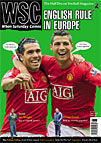 French speaking Belgium has been eclipsed politically thanks to industrial collapse, and the rise of the country's Flemish half has been reflected in football, too – until now, reports John Chapman
French speaking Belgium has been eclipsed politically thanks to industrial collapse, and the rise of the country's Flemish half has been reflected in football, too – until now, reports John Chapman
On Sunday April 20, Standard Liège defeated Anderlecht 2-0 to become Belgian champions for the first time in 25 years. Standard’s coach, the former national-team goalkeeper Michel Preud’homme, was given the keys to the city and politicians queued up to talk about the rebirth of Wallonia.
In 1983, when Standard last won the title, Belgium was a vastly different country. The steel and mining industries of French-speaking Wallonia were the country’s engine. Flanders had some internationally famous cities, but it primarily consisted of farm land. Over the next 25 years, all of that was to change. Wallonia saw its industries close, while Flanders attracted hi-tech investment. In 2007, there was political stalemate when Flemish politicians insisted on negotiating more power for their regional administration. Six months without a national government even led to talk of Flanders declaring independence. That didn’t happen, but, with local unemployment soaring, Wallonia’s population had nothing to cheer about. Until April 20.
For Standard Liège fans, beating Anderlecht to win the trophy was the icing on the cake. In those 25 years, only teams from Flanders had won the title: Club Brugge, Lierse, Beveren, Racing Genk, KV Mechelen – plus Anderlecht, based in Francophone Brussels but essentially a Flemish-run club.
Standard’s decline was reflected by the struggles of other clubs in the region, notably their neighbours FC Liège, who nearly went out of business and were forced to merge with lower-league Racing Tilleur. The product of this union has just won promotion from the third division.
Standard had often seemed on the verge of a comeback, but impatience was often their undoing. The club appointed managers and sacked them with impunity: former Belgium boss Robert Waseige after five games in 2002 and Dutchman Johan Boskamp, formerly of Stoke, after just four matches in 2006.
Two years earlier, however, a significant moment had come when agent Luciano D’Onofrio emerged from a background role at the club. Together with his friends such as Robert Louis-Dreyfus, a former CEO of Saatchi & Saatchi and owner of Olympic Marseille, D’Onofrio is said to have injected £25 million into Standard, most of which has gone into the club’s academy.
When Preud’homme replaced Boskamp in 2006, the decision of Les Rouches (rouges with a Wallonian accent) to bank on youth began to pay off. This season’s midfield was made up entirely of Belgians, all of whom were teenagers at kick-off. The two leading lights are Steven Defour – Belgian player of the year last season and Standard’s youngest-ever captain – and Marouane Fellaini, currently attracting attention from several Premier League clubs and a shoo‑in to be this season’s players’ player of the year. But perhaps the hardest pill for Anderlecht fans to swallow was the identity of the striker who scored both goals for Liège on April 20 – Dieumerci Mbokani. The 22-year-old Congolese had been sold by Anderlecht last summer, having been almost totally ignored by their then coach, Frankie Vercauteren.
Standard’s 1983 title was overshadowed by a bribery scandal when several players, including their current coach, were found guilty of arranging a crucial end-of-season win over Waterschei. Preud’homme continued to play for Standard after a short ban, but subsequently moved to Mechelen and Benfica, and was later voted goalkeeper of the tournament at the 1994 World Cup. Now he is being fêted by the country’s leaders – and not just in Wallonia. Even prime minister Yves Leterme, who is of aristocratic Flemish background, has displayed his affection for the club.
Standard Liège used to be consistent performers in international club competitions and once reached the European Cup semi-finals, in the distant days when only champions could enter. It has been a long while since Belgian sides have made any sort of impact in Europe and the league is unlikely ever again to attract the top-class foreign players who once flocked to its major clubs. But with their success built on excellent youth coaching, Standard have at least put down a marker for planning, patience and local pride.
From WSC 256 June 2008